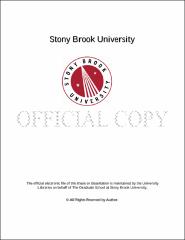| dc.identifier.uri | http://hdl.handle.net/11401/76902 | |
| dc.description.sponsorship | This work is sponsored by the Stony Brook University Graduate School in compliance with the requirements for completion of degree. | en_US |
| dc.format | Monograph | |
| dc.format.medium | Electronic Resource | en_US |
| dc.language.iso | en_US | |
| dc.publisher | The Graduate School, Stony Brook University: Stony Brook, NY. | |
| dc.type | Thesis | |
| dcterms.abstract | Cell Migration Inducing Protein (CEMIP) has been demonstrated to promote cancer progression by enhancing cancer cell migration, hence increasing cancer invasion and metastasis. Upregulated expression of CEMIP in human cancers is associated with poor patient survival rate. Experimental data demonstrated that CEMIP is exclusively detected in human colon cancer cells examined by immunohistochemistry staining. Interestingly, enhanced expression of CEMIP was found in cancer cells located at the invasive front. However, the regulatory mechanism of enhanced CEMIP expression in cancer has not been fully characterized. The aim of this study is to unravel the regulatory mechanism of CEMIP in cancer progression by focusing on post-transcriptional regulation of CEMIP in cancer cells. Employing a bioinformatics tool for identification of potential targeting sites by microRNA (miRNA) within the CEMIP 3'-untranslatioed region (3'UTR), miRNA -128(1,2) responding elements within the 3'UTR was identified. By surveying human cancer cell lines for CEMIP expression, downregulation of CEMIP was found in aggressive human cancer cell lines and inversely correlated with endogenous CEMIP expression. This observation is in agreement with miR128-1 and CEMIP expression in human colon cancer specimens examined by qPCR. To further determine the correlation of miRNA-128-1 with CMEIP expression, a miR128 inhibitor, called sponge, was generated. When the miR128 sponge was expressed in less aggressive cancer cell lines, CEMIP expression was rescued suggesting specific role of miR128-1 in CEMIP expression. miR128-1 no longer affects CEMIP gene expression once the miR128 binding site within the 3' UTR of CEMIP was mutated. Functionally, overexpression of miR-128-1 in the aggressive cancer cells reduces cell migration These findings suggest a novel regulatory pathway in invasive cancer cells, in which the upregulated transcription factor, Snail, reduces the expression of miR128-1, leading to stabilizing CEMIP mRNA, so expressed CEMIP then induce cancer cell migration. | |
| dcterms.available | 2017-09-20T16:51:24Z | |
| dcterms.contributor | Cao, Jian | en_US |
| dcterms.contributor | Ju, Jingfang | en_US |
| dcterms.creator | Zhang, Qian | |
| dcterms.dateAccepted | 2017-09-20T16:51:24Z | |
| dcterms.dateSubmitted | 2017-09-20T16:51:24Z | |
| dcterms.description | Department of Biochemistry and Cell Biology. | en_US |
| dcterms.extent | 25 pg. | en_US |
| dcterms.format | Monograph | |
| dcterms.format | Application/PDF | en_US |
| dcterms.identifier | http://hdl.handle.net/11401/76902 | |
| dcterms.issued | 2015-05-01 | |
| dcterms.language | en_US | |
| dcterms.provenance | Made available in DSpace on 2017-09-20T16:51:24Z (GMT). No. of bitstreams: 1
Zhang_grad.sunysb_0771M_12248.pdf: 7176945 bytes, checksum: f51f6a313bdcc8da38b5cb12205f3808 (MD5)
Previous issue date: 2015 | en |
| dcterms.publisher | The Graduate School, Stony Brook University: Stony Brook, NY. | |
| dcterms.subject | Biology | |
| dcterms.subject | cell migration, CEMIP, microRNA-128, post-transcriptinal regulation | |
| dcterms.title | miR-128 Inhibits Cell Migration via Downregulation of CEMIP | |
| dcterms.type | Thesis | |

